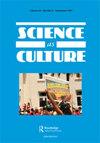Refused-knowledge during the COVID-19 Pandemic: Mobilising Experiential Expertise for Care and Well-being
IF 2.5
3区 哲学
Q1 CULTURAL STUDIES
引用次数: 1
Abstract
ABSTRACT Since the early period of the COVID-19 pandemic concerned groups of people have produced knowledge refused by institutional science of how to manage public health and individual well-being in everyday pandemic life. Research in science and technology studies seeks to understand the social and cultural conditions under which contestation over scientific knowledge claims occurs. In the Italian case, ‘refused’ knowledge claims emerging outside institutionalised science play a performative role in questioning the current models for managing individual and public health. Such refused claims ascribe novel meanings to the COVID-19 pandemic and orient the ways in which people manage their own health and well-being during their everyday life. Two interrelated dimensions are at stake in the production and enactment of refused knowledge: (1) how experiential expertise is mobilised to reframe one’s body in a process of self-care, thus validating a corpus of refused knowledge through personal experience, and (2) how narratives demarcate between a body of refused knowledge and the prevalent biomedical paradigms as a way of gaining experiential epistemic autonomy.2019冠状病毒病大流行期间被拒绝的知识:动员经验专长促进护理和福祉
自2019冠状病毒病(COVID-19)大流行早期以来,有关群体就如何在日常大流行生活中管理公共卫生和个人福祉产生了被制度科学拒绝的知识。科学和技术研究的研究旨在了解发生对科学知识主张的争论的社会和文化条件。在意大利的案例中,在制度化科学之外出现的“被拒绝的”知识主张在质疑当前管理个人和公共卫生的模式方面发挥了表演作用。这种被拒绝的说法赋予了COVID-19大流行新的意义,并为人们在日常生活中管理自己的健康和福祉的方式指明了方向。在被拒绝的知识的产生和实施过程中,有两个相互关联的维度处于危险之中:(1)如何在自我保健过程中调动经验专业知识来重塑一个人的身体,从而通过个人经验验证被拒绝的知识语料库,以及(2)如何将被拒绝的知识体与流行的生物医学范式区分开来,作为获得经验知识自主的一种方式。
本文章由计算机程序翻译,如有差异,请以英文原文为准。
求助全文
约1分钟内获得全文
求助全文
来源期刊

Science As Culture
Multiple-
CiteScore
5.20
自引率
3.80%
发文量
28
期刊介绍:
Our culture is a scientific one, defining what is natural and what is rational. Its values can be seen in what are sought out as facts and made as artefacts, what are designed as processes and products, and what are forged as weapons and filmed as wonders. In our daily experience, power is exercised through expertise, e.g. in science, technology and medicine. Science as Culture explores how all these shape the values which contend for influence over the wider society. Science mediates our cultural experience. It increasingly defines what it is to be a person, through genetics, medicine and information technology. Its values get embodied and naturalized in concepts, techniques, research priorities, gadgets and advertising. Many films, artworks and novels express popular concerns about these developments. In a society where icons of progress are drawn from science, technology and medicine, they are either celebrated or demonised. Often their progress is feared as ’unnatural’, while their critics are labelled ’irrational’. Public concerns are rebuffed by ostensibly value-neutral experts and positivist polemics. Yet the culture of science is open to study like any other culture. Cultural studies analyses the role of expertise throughout society. Many journals address the history, philosophy and social studies of science, its popularisation, and the public understanding of society.
 求助内容:
求助内容: 应助结果提醒方式:
应助结果提醒方式:


